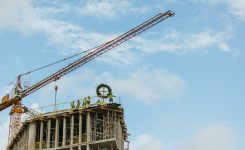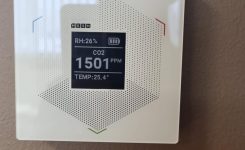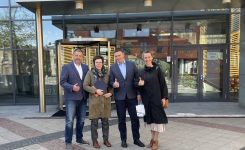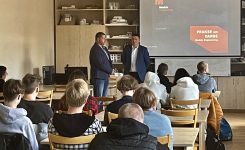2022
Moduls Engineering Closes the Project of the Installation of CO2 Air Quality Monitors
“Moduls Engineering” has installed nearly 14’000 CO2 air quality monitors across Latvia. According to the previously concluded contract, the units have been installed:
• In all the municipal educational institutions.
• In the state and APP institutions of general education.
• In the municipal institutions of vocational education.
• In the institutions of vocational education under the Ministry of Education and Science.
• In the institutions of vocational education under the Ministry of Culture.
• In the institutions of vocational education established by other founders.
• In the municipal social care centres.
• In the social care centres under the Ministry of Welfare.
“Implementation of the project was successful and according to schedule, despite several challenges during the course of the project. The greatest challenges were related to the comparatively high number of units, which had to be installed in practically the entire territory of Latvia within the previously set term of 40 days. Installation of the units in the educational institutions had to be adjusted to the study process to avoid affecting it to the extent possible”, says Mr Kristaps Grīniņš, Board Member of “Moduls Engineering”.
Key benefits from the CO2 air quality monitors
The key task of carbon dioxide (CO2) air quality monitors is to notify of an increased CO2 level in the room. Thus, the necessity to ventilate the room and thus increase the air quality and decrease the risks related to the spread of Covid-19 is indicated. The component of human exhalation which most significantly affects the air quality, is CO2 gas, but, together with the exhaled air, viruses and bacteria viable in the air also enter the rooms and accumulate; furthermore, an increased CO2 level slows down the concentration and causes fatigue, which significantly affects the students’ ability to receive information. The easiest and most effective way to control distribution of the virus in the air is to measure the CO2 level, since it indicates insufficient air exchange.
Measuring units also play a significant role in the assessment of the efficiency of the overall ventilation system, which enables considered and data-based decisions to be made regarding the best solution for the modernisation of the ventilation system. Possibly, in separate cases it will be enough to clean or balance the current ventilation system.
By accumulating historical measurement data, CO2 air quality monitors will serve as a diagnostics tool with the help of which conformity of the current ventilation system with the load and functions of the rooms can be assessed. Analysis of the obtained data will allow one to determine where the air quality is the poorest, and where the need to resolve the air exchange problem is most acute. Thus, it will be precisely characterised what the required air exchange capacity is for the built ventilation to both be sufficient and not entail unnecessary operational expenses.
Monitors can demonstrate the load of the rooms, which would allow the educational institutions to optimise the number of rooms used or to restructure studies to the vacant rooms to provide good ventilation in those with higher occupancy. Through the analysis of measurements of the temperature of units, conclusions can be made as to which rooms are overheated, and which are underheated. This data may be used to perform the correct reconstruction or adjustment of the heating system, if the system provides such a function.
Summary and analysis of measurement data
Since the installation of the monitors, the accumulated statistical data show that overall air quality in the institutions equipped with the monitors is acceptable (under 1700 ppm), whereas in 35% of the buildings it is even good (under 1000 ppm). Equipment has also enabled identification of the buildings with centralised forced ventilation, where the system did not work or was not balanced.
Additionally to the CO2 concentration, the sensors installed will collect and accumulate the temperature and moisture measurements. Measurement data will be stored in a server, where they will be accessible according to the needs of the Ministry of Education and Science and local governments. In case of necessity, data can also be forwarded to other systems, where it can be used and published as necessary.
“Moduls Engineering” is a part of the JSC (AS) “MN Holding” corporate group. 2022 marks the 28th year of operation of the company. During these years, the company has grown from a luminaire trader to one of the leading construction companies in the segment of engineering-technical and electrical-technical networks.









